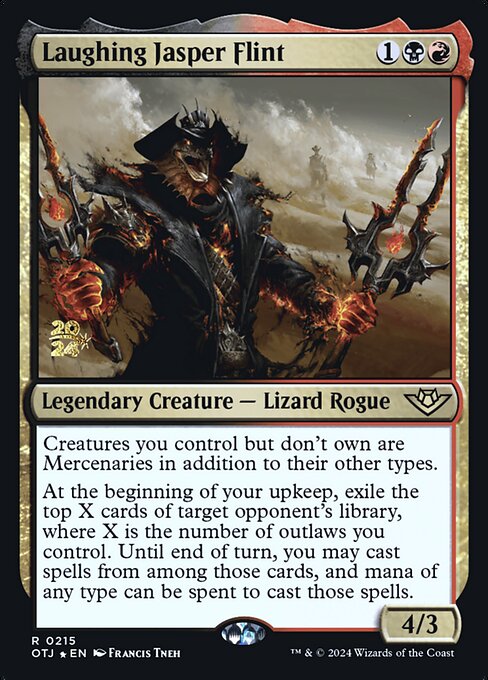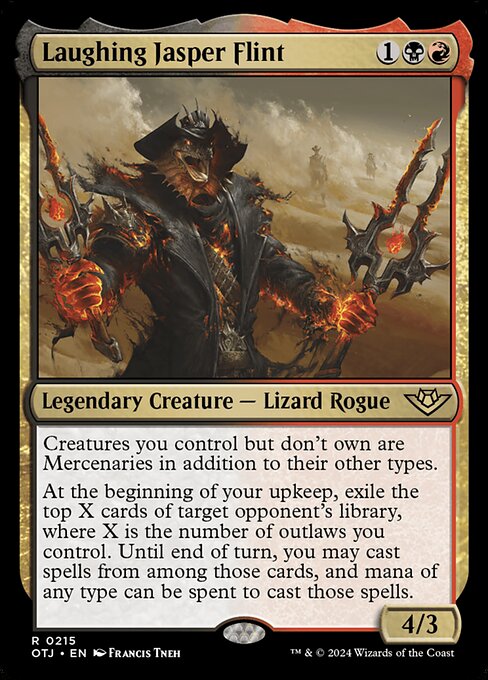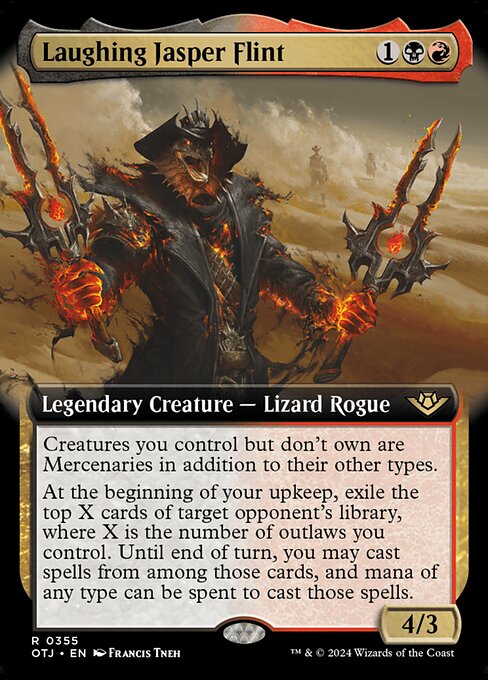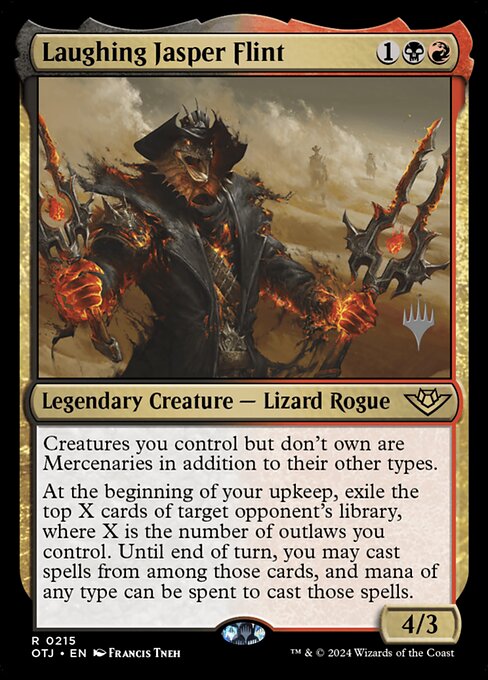Jasper Flint Beffardo
Creatura Leggendaria — Farabutto Lucertola
Le creature che controlli ma non possiedi sono Mercenari in aggiunta ai loro altri tipi.
All'inizio del tuo mantenimento, esilia le prime X carte del grimorio di un avversario bersaglio, dove X è il numero di fuorilegge che controlli. Fino alla fine del turno, puoi lanciare magie scelte tra quelle carte e puoi spendere mana di qualsiasi tipo per lanciarle.
All'inizio del tuo mantenimento, esilia le prime X carte del grimorio di un avversario bersaglio, dove X è il numero di fuorilegge che controlli. Fino alla fine del turno, puoi lanciare magie scelte tra quelle carte e puoi spendere mana di qualsiasi tipo per lanciarle.
4/3
standard
future
historic
gladiator
pioneer
explorer
modern
legacy
pauper
vintage
penny
commander
brawl
alchemy
paupercommander
duel
oldschool
premodern
Rulings
The value of X is determined as Laughing Jasper Flint’s last ability resolves.
Laughing Jasper Flint’s first ability applies to creatures you control but don’t own as they enter the battlefield. For example, if you control Laughing Jasper Flint and Vial Smasher, Gleeful Grenadier, having a creature an opponent owns that normally isn’t an outlaw enter the battlefield under your control will cause Vial Smasher’s ability to trigger.
A card, spell, or permanent is an outlaw if it has the Assassin, Mercenary, Pirate, Rogue, or Warlock creature type. It doesn’t matter if it has more than one of those creature types; as long as it has at least one, it’s an outlaw.
Outlaw is not a creature type. If an effect asks you to choose a creature type, you can’t choose outlaw.
You pay all costs and follow all normal timing rules for cards played from exile with Laughing Jasper Flint’s last ability. For example, if you exile a creature card this way, you must wait until your main phase to cast it.
If an ability refers to an outlaw or whether a player controls an outlaw, it’s referring only to permanents with one or more of the creature types specified above. Notably, it’s not referring to any spell or card not on the battlefield. However, other abilities may refer to an “outlaw spell” or “outlaw card” in a zone other than the battlefield. Those abilities refer to spells and cards with one or more of the specified creature types.
Laughing Jasper Flint’s first ability applies to creatures you control but don’t own as they enter the battlefield. For example, if you control Laughing Jasper Flint and Vial Smasher, Gleeful Grenadier, having a creature an opponent owns that normally isn’t an outlaw enter the battlefield under your control will cause Vial Smasher’s ability to trigger.
A card, spell, or permanent is an outlaw if it has the Assassin, Mercenary, Pirate, Rogue, or Warlock creature type. It doesn’t matter if it has more than one of those creature types; as long as it has at least one, it’s an outlaw.
Outlaw is not a creature type. If an effect asks you to choose a creature type, you can’t choose outlaw.
You pay all costs and follow all normal timing rules for cards played from exile with Laughing Jasper Flint’s last ability. For example, if you exile a creature card this way, you must wait until your main phase to cast it.
If an ability refers to an outlaw or whether a player controls an outlaw, it’s referring only to permanents with one or more of the creature types specified above. Notably, it’s not referring to any spell or card not on the battlefield. However, other abilities may refer to an “outlaw spell” or “outlaw card” in a zone other than the battlefield. Those abilities refer to spells and cards with one or more of the specified creature types.
Rulings
The value of X is determined as Laughing Jasper Flint’s last ability resolves.
Laughing Jasper Flint’s first ability applies to creatures you control but don’t own as they enter the battlefield. For example, if you control Laughing Jasper Flint and Vial Smasher, Gleeful Grenadier, having a creature an opponent owns that normally isn’t an outlaw enter the battlefield under your control will cause Vial Smasher’s ability to trigger.
A card, spell, or permanent is an outlaw if it has the Assassin, Mercenary, Pirate, Rogue, or Warlock creature type. It doesn’t matter if it has more than one of those creature types; as long as it has at least one, it’s an outlaw.
Outlaw is not a creature type. If an effect asks you to choose a creature type, you can’t choose outlaw.
You pay all costs and follow all normal timing rules for cards played from exile with Laughing Jasper Flint’s last ability. For example, if you exile a creature card this way, you must wait until your main phase to cast it.
If an ability refers to an outlaw or whether a player controls an outlaw, it’s referring only to permanents with one or more of the creature types specified above. Notably, it’s not referring to any spell or card not on the battlefield. However, other abilities may refer to an “outlaw spell” or “outlaw card” in a zone other than the battlefield. Those abilities refer to spells and cards with one or more of the specified creature types.
Laughing Jasper Flint’s first ability applies to creatures you control but don’t own as they enter the battlefield. For example, if you control Laughing Jasper Flint and Vial Smasher, Gleeful Grenadier, having a creature an opponent owns that normally isn’t an outlaw enter the battlefield under your control will cause Vial Smasher’s ability to trigger.
A card, spell, or permanent is an outlaw if it has the Assassin, Mercenary, Pirate, Rogue, or Warlock creature type. It doesn’t matter if it has more than one of those creature types; as long as it has at least one, it’s an outlaw.
Outlaw is not a creature type. If an effect asks you to choose a creature type, you can’t choose outlaw.
You pay all costs and follow all normal timing rules for cards played from exile with Laughing Jasper Flint’s last ability. For example, if you exile a creature card this way, you must wait until your main phase to cast it.
If an ability refers to an outlaw or whether a player controls an outlaw, it’s referring only to permanents with one or more of the creature types specified above. Notably, it’s not referring to any spell or card not on the battlefield. However, other abilities may refer to an “outlaw spell” or “outlaw card” in a zone other than the battlefield. Those abilities refer to spells and cards with one or more of the specified creature types.
Your collection? Your decks?
Want to manage your collection and/or create decks?



 0
0
 0.74€
0.74€

